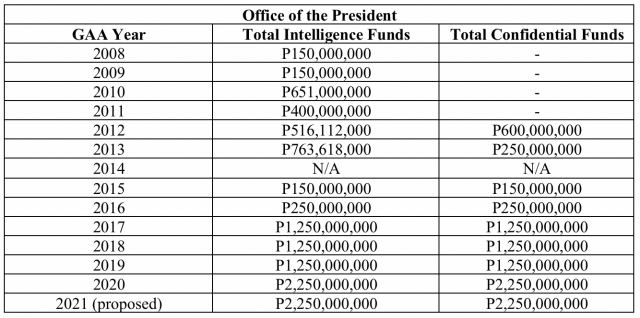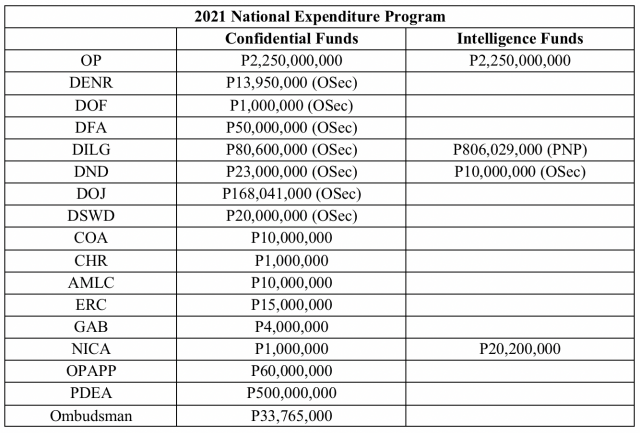Duterte still tops in intel, confidential funds
The Office of the President continues to receive the highest amount of intelligence and confidential funds under the proposed P4.5 trillion national budget for 2021, budget documents show.
Under the 2021 National Expenditure Program (NEP), which Malacañang itself prepared, the allocation for intelligence and confidential funds for President Rodrigo Duterte's office remain at P2.25 billion each, or P4.5 billion in total.
This makes up 55% of the total allocation for the President's office for next year, which is at P8.19 billion.
Moreover, the intelligence funds under the Office of the President comprise 47% of the proposed P4.8 billion total intelligence funds for next year, while its confidential funds make up 64% of the proposed P3.5 billion total confidential funds.
Topping the list of the agencies with the highest intelligence and confidential funds, however, is nothing new for the Office of the President.
In fact, for this fiscal year, it also has the biggest allocation for intelligence and confidential funds, also at P2.5 billion each.
Back in 2019, the Office of the President had a budget of P1.25 billion each for intelligence and confidential funds, which means these amounts have increased by P1 billion each in just a span of one year.
The increasing intelligence and confidential funds of the President’s office is not without precedence. Data available on the website of the Department of Budget and Management (DBM) show that these allocations have generally increased since 2008.
However, it was only during Duterte’s presidency that the intelligence and confidential funds under the Office of the President have reached the billion-peso mark.
In 2016, when former President Benigno Aquino III left Malacañang, the intelligence and confidential funds under his office were only pegged at P250 million each.

Other gov't agencies
Aside from the Office of the President, other government agencies have their own share of intelligence and confidential funds, too.
In the proposed P4.5-trillion national budget for 2021, the Philippine National Police under the Department of the Interior and Local Government (DILG) will receive the biggest allocation for intelligence funds after the Office of the President, at P806 million.
The National Intelligence Coordinating Agency follows, with P20.2 million, then the Department of National Defense - Office of the Secretary, at P10 million.

When it comes to confidential funds, the Philippine Drug and Enforcement Agency ranks second to the Office of the President for having the biggest allocation, with P500 million.
It is followed by the Department of Justice - Office of the Secretary, at P168,041,000, then the Department of the Interior and Local Government - Office of the Secretary, at P80.6 million.
Interestingly, the two agencies with the biggest intelligence and confidential funds after the Office of the President are the ones that take a primary role in the government’s efforts against illegal drugs.
What are intel, confi funds?
Although the functions of intelligence and confidential funds are somehow interrelated, the biggest difference between them is that intelligence funds are for uniformed and military personnel, while confidential funds are for civilian government agencies.
The general provisions section of the 2021 NEP defines intelligence funds as those "related to intelligence information gathering activities of uniformed and military personnel, and intelligence practitioners" having direct impact to national security.
Meanwhile, confidential funds are those "related to surveillance activities in civilian government agencies that are intended to support the mandate or operations of the agency."
However, due to their nature, expenses under intelligence and confidential funds cannot be easily audited, unlike other regular expenditures of government agencies.
The Joint Circular No. 2015-01, issued by Commission on Audit (COA) and four other government bodies on January 8, 2015, governs the spending of intelligence and confidential funds, as well as the auditing of expenses under it.
While regular government expenses are audited by a designated team from COA, reports on the use of intelligence funds are submitted to the President, while those on the use of confidential funds are sent to the President, Senate President, Speaker of the House or to the Secretary of the DILG.
COA chairperson, Michael Aguinaldo, in an email interview, said that following the joint circular “all disbursements from the CF (confidential fund) and/or IF (intelligence fund) shall be supported with documentary evidence of payment, which are kept at all times in the vault of the designated special disbursing office... of the agency.”
“The same may be inspected by the officers/personnel duly authorized in writing by the COA chairperson, if circumstances so demand,” he added.
Before the joint circular was issued, both the cash advance and liquidation report were being post-audited by the Office of the COA chairperson, Aguinaldo said.
Opposition
Critics of the government, both civilians and public officials, have consistently opposed the increasing allocation for intelligence and confidential funds, especially under the Office of the President.
Opposition against these allocations surfaced anew following the recent bombing incidents in Jolo, Sulu, which claimed at least 15 lives and wounded 75 others.
Gabriela Women's Party Representative Arlene Brosas questioned how the perpetrators of the bombing incident were able to slip through the multimillion-peso intelligence fund of the military under this year's budget.
“Paano nakalusot ang bombing incident na ito sa Philippine military gayong milyon-milyon ang intelligence fund nila?" she said in a statement.
"Bago sila manawagan ng Martial Law, sagutin muna nila kung saan napupunta ang pondo ng bayan,” she added.
The Kabataan party-list likewise raised concern if the intelligence funds under the Office of the President as well as under the police and military are being used for their intended purposes following the Jolo bombings.
However, Budget Secretary Wendel Avisado said it is not the DBM that should explain the big allocations for intelligence and confidential funds of the Office of the President and how it is being used.
"It is not for DBM to justify but the Office of the President (OP) so Congress can raise all kinds of questions to the OP once their budget is heard," Avisado told GMA News Online.
"The Executive Secretary usually attends for the OP. I will defer to him as I do not have the authority to speak for them," he added.
GMA News Online also reached out to Executive Secretary Salvador Medialdea for comment but he has yet to respond as of posting time.—LDF, GMA News




